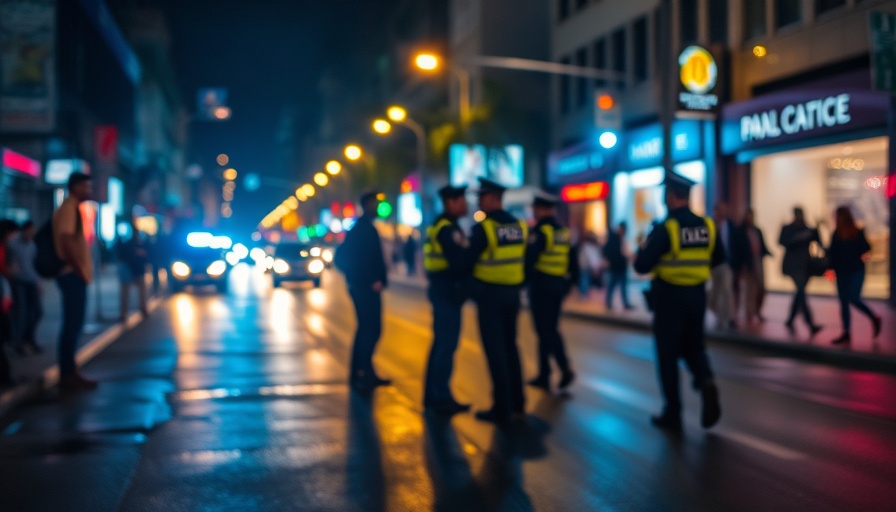
Governor's Bold Move: Deploying National Guard Amid Rising Crime
In a dramatic response to escalating violence and crime problems in Albuquerque, New Mexico, Governor Michelle Lujan Grisham declared a state of emergency on April 8, 2025. The governor's decisive action follows the alarming request from Albuquerque's Police Chief Harold Medina, who underscored the severe impacts of the fentanyl crisis and a notable surge in violent juvenile crime. This deployment embodies a shift in strategies for tackling urban crime, signaling a commitment to restoring public safety.
Context of the Emergency: Fentanyl and Violent Crime
New Mexico has been grappling with a deepening fentanyl epidemic, a crisis that has intensified the state's struggle with violent crime. The alarming statistics not only reflect a broader national issue but also highlight unique regional challenges faced by local law enforcement. Albuquerque has witnessed troubling trends, including increases in violent attacks amidst an overcrowded justice system.
The necessity for National Guard involvement stems from the experience of previous deployments in similar scenarios across the United States. For instance, the National Guard assisted during the COVID-19 pandemic, showcasing their ability to provide crucial support in emergencies. However, the current measures raise important questions about the balance between military resources and community-oriented policing.
Operational Focus: National Guard's Role in Albuquerque
The National Guard troops will focus on non-enforcement tasks that can alleviate pressure on local law enforcement. They will assist with duties including traffic control and crime scene security, allowing police officers to concentrate on direct law enforcement efforts. This strategic allocation intends to enhance the effectiveness of patrols while addressing immediate public safety needs.
As these troops prepare for deployment, their training will encompass operational protocols aimed at minimizing potential conflicts while engaging with civilians. By stepping in to perform less critical tasks, the National Guard aims to improve officer engagement with the community, fostering a better relationship between law enforcement and residents.
Concerns About Militarization of Law Enforcement
While the prospect of National Guard involvement may seem like a viable solution, it has sparked critical discussions about the militarization of police forces. Advocacy groups, including the ACLU of New Mexico, have raised red flags about historical instances where military support for local policing leads to civil rights infringements. Daniel Williams, a policy advocate for the ACLU, voiced concerns that integrating military resources into civilian policing may escalate incidents of racial profiling, particularly against marginalized communities.
This discourse prompts a broader examination of how societies allocate resources to combat crime while ensuring accountability and safeguarding civil liberties. Advocates emphasize the need for community resilience and reform initiatives that address the systemic issues underlying crime rather than relying on military solutions.
The Future of Public Safety in Albuquerque
The complexities surrounding crime in Albuquerque highlight a growing national debate about public safety in urban areas. Governor Lujan Grisham's strategy not only reflects immediate responses to crime spikes but also implies necessary long-term solutions rooted in community engagement and law enforcement accountability.
As the National Guard readies to take on supportive roles, Albuquerque residents and officials must remain vigilant about how these measures will affect the broader landscape of public safety. Policymakers have a crucial opportunity to enhance law enforcement strategies by leveraging technology—such as AI analytics for crime prediction and body cameras to increase transparency—in conjunction with community outreach to build trust and confidence in law enforcement efforts.
Embracing Change: The Role of Law Enforcement Technology
In response to shifting patterns in crime, it is imperative for law enforcement agencies to invest in innovative solutions and technologies that improve operational efficiency while enhancing community trust. Body-worn cameras, for example, not only bolster officer accountability but also serve as invaluable tools in documenting interactions with the public. As community members express concerns over police brutality and use of force, the integration of new technologies becomes critical in fostering a culture of transparency and trust.
This is a pivotal moment for Albuquerque’s law enforcement community as they navigate the complexities of community safety in partnership with innovative technological solutions. Enhanced training programs that incorporate mental health awareness and community relations can help rehabilitate the reputation of law enforcement agencies across the state.
Call to Action: Engage in the Community
The recent decisions by state leaders emphasize the need for robust dialogues between law enforcement and community members. We encourage public safety stakeholders, including police departments and community organizations, to collaborate in reassessing and reforming policies to ensure that public safety is maintained through inclusion and engagement rather than militarization.
Only through strong, transparent relationships can we effectively reduce crime, increase trust, and foster thriving communities.
 Add Row
Add Row  Add
Add 

 Add Element
Add Element 




Write A Comment